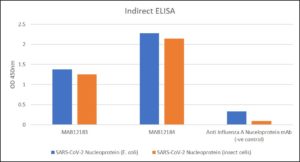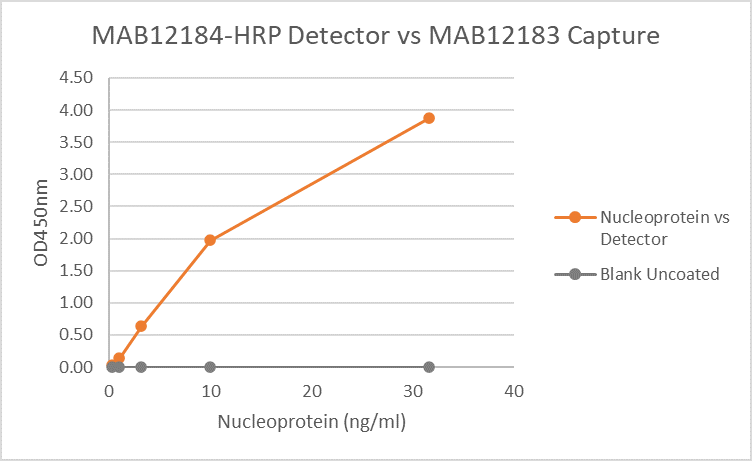
Indirect ELISA: MAB12183 and MAB12184 vs. two different recombinant SARS-CoV-2 (COVID-19) nucleoproteins. Antigens were coated at 2 µg/ml PBS overnight at RT, washed 2X with PBS + 0.3% tween-10 (PBST). Wells blocked with 1% normal goat serum in PBS a minimum of 30 minutes. Antibodies applied at 1 µg/ml PBST for 30 min at RT, washed 2X with PBST. Note: anti Influenza A Nucleoprotein included as a negative control antibody. Goat antibody to mouse IgG+ IgM/HRP conjugate (Jackson Immuno) at 0.5 µg/ml in PBST for 30 minutes at RT. Washed 2X with PBST. TMB added for 1 min.

Sandwich ELISA: MAB12183 and MAB12184 vs. recombinant SARS-CoV-2 (COVID-19) nucleoprotein. Plates (Greiner 762071 high binding) were coated overnight at room temperature with antibody at 10µg/ml, 100µl/well in GIBCO DPBS. Plates then washed 2 X 300µl/well with 1% BSA (Sigma A7906) in DPBS, second wash left in the wells 1-2 h. Plates washed 1 X 300µl/well DPBS with 0.1% Tween 20 (Sigma P1379) drained inverted on tissue and used. Dilutions of analyte prepared in DPBS/1% BSA/0.1% Tween 20. Added to wells at 100µl/well and incubated 2.5 h at ambient on a plate shaker. Plates washed 3 X 300µl DPBS 0.1% Tween 20. Antibody-HRP diluted in DPBS/1% BSA/0.1% Tween 20 to 1µg/ml. Added to wells at 100µl/well and incubated 2.5 h at ambient on a plate shaker. Plates washed 6 X 300µl DPBS 0.1% Tween 20. TMB substrate (Europa MO701A) added at 100µl/well, incubated without shaking 15 min at ambient. Reaction stopped using 1M HCl, read within 15 min at 450nm and 405nm (405 used to estimate wells >3.9 OD units).
Mouse Anti-SARS Coronavirus Nucleoprotein Antibody (3851)
Price range: $0.00 through $1,139.31 excl. VAT
Mouse monoclonal antibody specific for SARS Coronavirus Nucleoprotein. Antibody is also reactive with the NP of SARS-CoV-2 (COVID-19) by ELISA. It does not react with human Coronavirus 229E, NL63, HKU1 or OC43. Antibody is suitable for use as a matched pair with MAB12183 in sandwich ELISA assays. Available as HRP conjugated and biotinylated.
MOUSE ANTI-SARS CORONAVIRUS NUCLEOPROTEIN ANTIBODY (3851)
SARS Coronavirus Nucleoprotein antibody is specific for the nucleocapsid protein of Severe acute respiratory syndrome Coronavirus (SARS-CoV) and also recognises the NP of SARS-CoV-2 (COVID-19) by ELISA. SARS Coronavirus Nucleoprotein antibody does not react with human Coronavirus 229E, NL63, HKU1 or OC43, feline FIP-1, FIP-2, canine Coronavirus TGEV or mouse hepatitis virus. Antibody is suitable for use as a matched pair with MAB12183 in sandwich ELISA assays.
PRODUCT DETAILS – MOUSE ANTI-SARS CORONAVIRUS NUCLEOPROTEIN ANTIBODY (3851)
- Mouse anti SARS-CoV Nucleoprotein monoclonal IgG2b antibody (clone 3851).
- Greater than 90% purity by SDS-PAGE and buffered in PBS, pH7.2.
- Antibody is suitable for use as a matched pair with MAB12183 in sandwich ELISA assays.
- Available as HRP conjugated and biotinylated.
BACKGROUND
Severe acute respiratory syndrome (SARS) is a lower respiratory tract illness that was first reported in patients from the Guandong Province of China in November 2002. The causative agent, which was previously unknown, was isolated in 2003 and named as SARS coronavirus (SARS-CoV). The SARS coronavirus is an enveloped, single-stranded, positive RNA virus of the family Coronoviridae (NCBI) The virus is thought to have a zoonotic origin, with the horseshoe bat being the primary natural reservoir, but this has not been confirmed. Mammals, including the palm civet, may act as intermediate hosts.
In 2003, the SARS coronavirus spread rapidly and affected over 8,000 people in 26 countries. The rapid spread of SARS-CoV is thought to be due to person-to-person transmission of the virus via aerosol droplets or close contact with infected individuals. Since the end of the SARS epidemic, cases of SARS have only occurred in laboratory workers that have been accidently infected (WHO).
The symptoms of SARS infection are like influenza and include fever, malaise, muscle pain, headache, diarrhoea and shivering. Clinical symptoms may also include coughing and shortness of breath. Respiratory distress may rapidly develop in some patients, resulting in death. SARS disease has a high rate of mortality and resulted in 774 deaths during the first epidemic in 2003.
Currently, no licenced vaccine is available for the prevention of SARS infection. SARS continues to be of global health concern due to the rapid spread of the virus, the high mortality rate and the fears of a future SARS outbreak.
REFERENCES
- NCBI: Severe Acute Respiratory Syndrome Coronovirus
- World Health Organization: SARS (Severe Acute Respiratory Syndrome)

